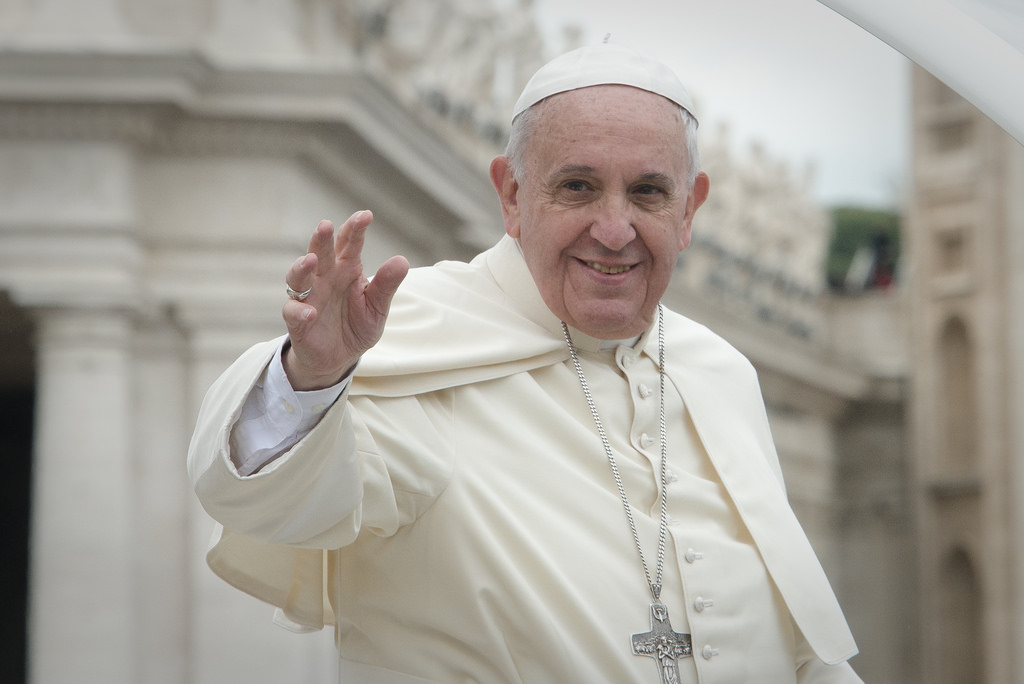Pope Francis’ Message for World Food Day
Published: October 14, 2016
On the occasion of the World Food Day, this Sunday Oct. 16, which this year has as theme: “The Climate Is Changing,” Pope Francis sent to the Director General of the United Nations Food and Agriculture Organization (FAO), the following Vatican-provided message:
* * *
To Professor José Graziano da Silva
Director General of the FAO
Illustrious Sir,
1. The fact that the FAO has chosen to devote today’s World Food Day to the theme “Climate is changing. Food and agriculture must too”, leads us to consider the struggle against hunger as an even more difficult objective to attain in the presence of a complex phenomenon such as climate change. With regard to facing the challenges that nature poses to man, and that man poses to nature (cf. Enc. Laudato si’, 25), I would like to submit some reflections to the consideration of the FAO, its Member States and those who participate in its activity.
What is the cause of the current climate change? We must question our individual and collective responsibilities, without resorting to the facile sophistry that hides behind statistical data or conflicting predictions. This does not mean abandoning the scientific data we need more than ever, but rather going beyond merely interpreting the phenomenon or recording its many effects.
Our condition as people who are necessarily in relation to one another, and our responsibility as the guardians of creation and its order, require us to retrace the causes of the current changes and to go to their root. First and foremost, we must admit that the many negative effects on the climate derive from the daily behaviour of people, communities, populations and States. If we are aware of this, a mere evaluation in ethical and moral terms is not sufficient. It is necessary to act politically and therefore to make the necessary decisions, to discourage or promote certain behaviours and lifestyles, for the sake of the new generations and those to come. Only in this way can we preserve the planet.
The responses to be put into effect must be suitably planned, and cannot be the fruit of emotion or fleeting motives. It is important to plan them. In this task, an essential role is played by the institutions called upon to work together, inasmuch as the action of individuals, while necessary, becomes effective only if framed in a network made up of people, public and private bodies, and national and international apparatuses. This network, however, cannot remain anonymous; this network is fraternity, and must act on the basis of its fundamental solidarity.
2. Those who are engaged in work in the fields, in farming, in small-scale fishing, or in the forests, or those who live in rural areas in direct contact with the effects of climate change, are aware that if the climate changes, their life changes too. Their daily lives are affected by difficult or at times dramatic situations, the future becomes increasingly uncertain and in this way the thought of abandoning homes and loved ones begins to arise. There is a prevalent sense of abandonment, the feeling of being abandoned by institutions, deprived of possible technical contributions or even of just consideration on the part of all those of us who benefit from their work.
From the wisdom of rural communities we can learn a style of life that can help defend us from the logic of consumerism and production at any cost, a logic that, cloaked in good justifications, such as the increasing population, is in reality aimed solely at the increase of profit. In the sector in which the FAO works, there is a growing number of people who believe they are omnipotent, or able to ignore the cycles of the seasons and to improperly modify the various animal and plant species, leading to the loss of variety that, if it exists in nature, has and must have its role. Producing qualities that may give excellent results in the laboratory may be advantageous for some, but have ruinous effects for others. And the principle of caution is not enough, as very often it is limited to not allowing something to be done, whereas there is a need to act in a balanced and honest way. Genetic selection of a quality of plant may produce impressive results in terms of yield, but have we considered the terrain that loses its productive capacity, farmers who no longer have pasture for their livestock, and water resources that become unusable? And above all, do we ask if and to what extent we contribute to altering the climate?
KEEP READING ON ZENIT

